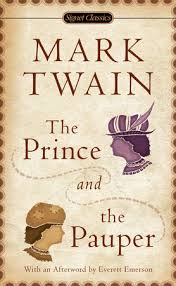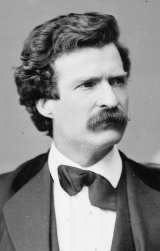The Prince and the Pauper Page #15
The Prince and the Pauper is a novel by American author Mark Twain. It was first published in 1881 in Canada, before its 1882 publication in the United States. The novel represents Twain's first attempt at historical fiction.
“Long live the King!” Poor Tom’s dazed eyes wandered abroad over this stupefying spectacle, and finally rested dreamily upon the kneeling princesses beside him, a moment, then upon the Earl of Hertford. A sudden purpose dawned in his face. He said, in a low tone, at Lord Hertford’s ear-- “Answer me truly, on thy faith and honour! Uttered I here a command, the which none but a king might hold privilege and prerogative to utter, would such commandment be obeyed, and none rise up to say me nay?” “None, my liege, in all these realms. In thy person bides the majesty of England. Thou art the king--thy word is law.” Tom responded, in a strong, earnest voice, and with great animation-- “Then shall the king’s law be law of mercy, from this day, and never more be law of blood! Up from thy knees and away! To the Tower, and say the King decrees the Duke of Norfolk shall not die!” The words were caught up and carried eagerly from lip to lip far and wide over the hall, and as Hertford hurried from the presence, another prodigious shout burst forth-- “The reign of blood is ended! Long live Edward, King of England!” CHAPTER XII. The Prince and his Deliverer. As soon as Miles Hendon and the little prince were clear of the mob, they struck down through back lanes and alleys toward the river. Their way was unobstructed until they approached London Bridge; then they ploughed into the multitude again, Hendon keeping a fast grip upon the Prince’s--no, the King’s--wrist. The tremendous news was already abroad, and the boy learned it from a thousand voices at once--“The King is dead!” The tidings struck a chill to the heart of the poor little waif, and sent a shudder through his frame. He realised the greatness of his loss, and was filled with a bitter grief; for the grim tyrant who had been such a terror to others had always been gentle with him. The tears sprang to his eyes and blurred all objects. For an instant he felt himself the most forlorn, outcast, and forsaken of God’s creatures--then another cry shook the night with its far-reaching thunders: “Long live King Edward the Sixth!” and this made his eyes kindle, and thrilled him with pride to his fingers’ ends. “Ah,” he thought, “how grand and strange it seems--I am King!” Our friends threaded their way slowly through the throngs upon the bridge. This structure, which had stood for six hundred years, and had been a noisy and populous thoroughfare all that time, was a curious affair, for a closely packed rank of stores and shops, with family quarters overhead, stretched along both sides of it, from one bank of the river to the other. The Bridge was a sort of town to itself; it had its inn, its beer-houses, its bakeries, its haberdasheries, its food markets, its manufacturing industries, and even its church. It looked upon the two neighbours which it linked together--London and Southwark--as being well enough as suburbs, but not otherwise particularly important. It was a close corporation, so to speak; it was a narrow town, of a single street a fifth of a mile long, its population was but a village population and everybody in it knew all his fellow-townsmen intimately, and had known their fathers and mothers before them--and all their little family affairs into the bargain. It had its aristocracy, of course--its fine old families of butchers, and bakers, and what-not, who had occupied the same old premises for five or six hundred years, and knew the great history of the Bridge from beginning to end, and all its strange legends; and who always talked bridgy talk, and thought bridgy thoughts, and lied in a long, level, direct, substantial bridgy way. It was just the sort of population to be narrow and ignorant and self-conceited. Children were born on the Bridge, were reared there, grew to old age, and finally died without ever having set a foot upon any part of the world but London Bridge alone. Such people would naturally imagine that the mighty and interminable procession which moved through its street night and day, with its confused roar of shouts and cries, its neighings and bellowing and bleatings and its muffled thunder-tramp, was the one great thing in this world, and themselves somehow the proprietors of it. And so they were, in effect--at least they could exhibit it from their windows, and did--for a consideration--whenever a returning king or hero gave it a fleeting splendour, for there was no place like it for affording a long, straight, uninterrupted view of marching columns. Men born and reared upon the Bridge found life unendurably dull and inane elsewhere. History tells of one of these who left the Bridge at the age of seventy-one and retired to the country. But he could only fret and toss in his bed; he could not go to sleep, the deep stillness was so painful, so awful, so oppressive. When he was worn out with it, at last, he fled back to his old home, a lean and haggard spectre, and fell peacefully to rest and pleasant dreams under the lulling music of the lashing waters and the boom and crash and thunder of London Bridge. In the times of which we are writing, the Bridge furnished ‘object lessons’ in English history for its children--namely, the livid and decaying heads of renowned men impaled upon iron spikes atop of its gateways. But we digress. Hendon’s lodgings were in the little inn on the Bridge. As he neared the door with his small friend, a rough voice said-- “So, thou’rt come at last! Thou’lt not escape again, I warrant thee; and if pounding thy bones to a pudding can teach thee somewhat, thou’lt not keep us waiting another time, mayhap,”--and John Canty put out his hand to seize the boy. Miles Hendon stepped in the way and said-- “Not too fast, friend. Thou art needlessly rough, methinks. What is the lad to thee?” “If it be any business of thine to make and meddle in others’ affairs, he is my son.” “‘Tis a lie!” cried the little King, hotly. “Boldly said, and I believe thee, whether thy small headpiece be sound or cracked, my boy. But whether this scurvy ruffian be thy father or no, ’tis all one, he shall not have thee to beat thee and abuse, according to his threat, so thou prefer to bide with me.” “I do, I do--I know him not, I loathe him, and will die before I will go with him.” “Then ’tis settled, and there is nought more to say.” “We will see, as to that!” exclaimed John Canty, striding past Hendon to get at the boy; “by force shall he--” “If thou do but touch him, thou animated offal, I will spit thee like a goose!” said Hendon, barring the way and laying his hand upon his sword hilt. Canty drew back. “Now mark ye,” continued Hendon, “I took this lad under my protection when a mob of such as thou would have mishandled him, mayhap killed him; dost imagine I will desert him now to a worser fate?--for whether thou art his father or no--and sooth to say, I think it is a lie--a decent swift death were better for such a lad than life in such brute hands as thine. So go thy ways, and set quick about it, for I like not much bandying of words, being not over-patient in my nature.”
Translation
Translate and read this book in other languages:
Select another language:
- - Select -
- 简体中文 (Chinese - Simplified)
- 繁體中文 (Chinese - Traditional)
- Español (Spanish)
- Esperanto (Esperanto)
- 日本語 (Japanese)
- Português (Portuguese)
- Deutsch (German)
- العربية (Arabic)
- Français (French)
- Русский (Russian)
- ಕನ್ನಡ (Kannada)
- 한국어 (Korean)
- עברית (Hebrew)
- Gaeilge (Irish)
- Українська (Ukrainian)
- اردو (Urdu)
- Magyar (Hungarian)
- मानक हिन्दी (Hindi)
- Indonesia (Indonesian)
- Italiano (Italian)
- தமிழ் (Tamil)
- Türkçe (Turkish)
- తెలుగు (Telugu)
- ภาษาไทย (Thai)
- Tiếng Việt (Vietnamese)
- Čeština (Czech)
- Polski (Polish)
- Bahasa Indonesia (Indonesian)
- Românește (Romanian)
- Nederlands (Dutch)
- Ελληνικά (Greek)
- Latinum (Latin)
- Svenska (Swedish)
- Dansk (Danish)
- Suomi (Finnish)
- فارسی (Persian)
- ייִדיש (Yiddish)
- հայերեն (Armenian)
- Norsk (Norwegian)
- English (English)
Citation
Use the citation below to add this book to your bibliography:
Style:MLAChicagoAPA
"The Prince and the Pauper Books." Literature.com. STANDS4 LLC, 2024. Web. 25 Dec. 2024. <https://www.literature.com/book/the_prince_and_the_pauper_315>.




Discuss this The Prince and the Pauper book with the community:
Report Comment
We're doing our best to make sure our content is useful, accurate and safe.
If by any chance you spot an inappropriate comment while navigating through our website please use this form to let us know, and we'll take care of it shortly.
Attachment
You need to be logged in to favorite.
Log In